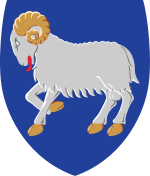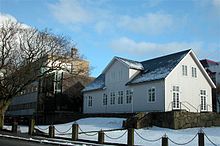Løgting
|
Parliament of the Faroe Islands Føroya Løgting/Løgtingið (Faroese) |
|
|---|---|
 |
|
| Type | |
| Type | |
| Leadership | |
| Structure | |
| Seats | 33 |
 |
|
|
Political groups
|
Government (16)
Social Democratic Party: 7 seats
Republic: 7 seats
Progress: 2 seats
Supported by (1)
Independent: 1 seat
Opposition (16)
Centre Party: 2 seats
New Self-Government: 2 seats
Union Party: 6 seats
People's Party: 6 seats
|
| Elections | |
|
Last election
|
1 September 2015 |
|
Next election
|
By 1 September 2019 |
| Meeting place | |
 |
|
| Tórshavn | |
| Website | |
| www |
|
Government (16)
Supported by (1)
Opposition (16)
Løgting (pronounced [ˈlœktɪŋɡ] (Faroese: Føroya Løgting or just Løgtingið, Danish: Færøernes Lagting/Lagtinget, both meaning The løgting of the Faroes) is the unicameral parliament of the Faroe Islands, a self-ruling dependency of Denmark.
The name literally means "Law Thing"—that is, a law assembly—and derives from Old Norse lǫgþing, which was a name given to ancient assemblies. A ting or þing has existed on the Faroe Islands for over a millennium and the Løgting was the highest authority on the islands in the Viking era. From 1274 to 1816 it functioned primarily as a judicial body, whereas the modern Løgting established in 1852 is a parliamentary assembly, which gained legislative power when home rule was introduced in 1948. The Manx Tynwald and the Icelandic Alþing are the two other modern parliaments with ties back to the old Norse assemblies of Europe.
Today, the Faroe Islands compromise one constituency, and the number of MPs is fixed at 33. The first election with this new system was held on 19 January 2008, after the Election law was changed in late 2007, prior to which the membership of the Løgting varied from 27 to 32. The 7 constituencies had 27 seats and up to 5 supplementary seats. That Election Act came into force in 1978, and the eight general elections between 1978 and 2004 all resulted in 32 members.
The Løgting is elected for a period of four years. Election of the Løgting can take place before the end of an election period if the Løgting agrees on dissolving itself. The Løgmaður (Prime Minister) issues a proclamation of the forthcoming election and appoints the day of election, which must take place, at the earliest, six weeks after the proclamation.
...
Wikipedia
